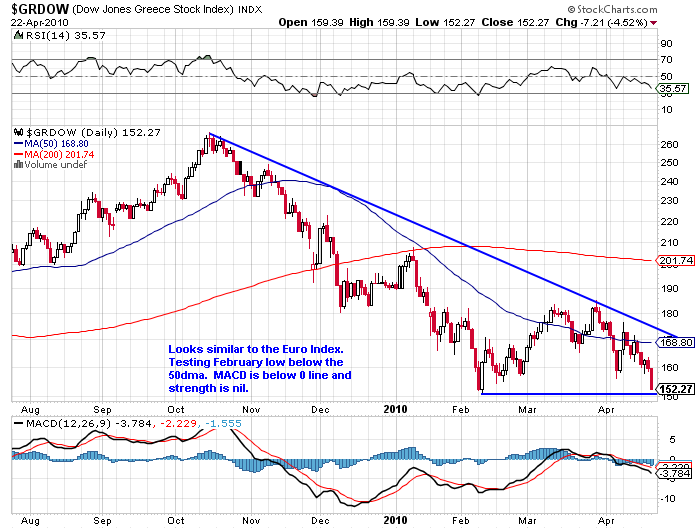The debt crisis in Greece looks set to dominate a meeting of the International Monetary Fund (IMF) in Washington.
Greek Finance Minister George Papaconstantinou is due to hold talks with IMF head Dominique Strauss-Kahn and EU economy commissioner Olli Rehn.
On Friday, Greece asked for an EU-IMF bailout of its debt-ridden economy.
Ahead of the meeting, the Group of 20 big economies said the world was emerging faster than expected from its deep recession.
After talks in Washington on Friday, G20 finance ministers said the pace of the recovery was largely due to the huge amounts of government money pumped into national economies.
Debt due
Saturday's focus is set to be on the IMF meeting and consideration of Greece's request for emergency loans totalling 40bn euros ($53bn; £35bn) in the first year.
Nations using the euro would contribute 30bn euros with the rest coming from the IMF.
The terms of the loans have not been agreed, but Mr Strauss-Kahn has said the IMF will "move expeditiously" in response to Greece's appeal.
Mr Rehn said he thought the EU-IMF package could be completed by early May.
The funds are needed later that month when a large tranche of Greece's debt comes due for renewal.
German officials have said Berlin will do its bit.
But there has been public opposition to funding a bail-out and Chancellor Angela Merkel said any aid would come with "very strict conditions", including a credible savings plan.
The Greek government has already taken austerity measures, including cutting government workers' pay, freezing pensions and raising taxes.
The cuts have proved unpopular, prompting strikes and demonstrations.
There is rising anger at the involvement of the IMF and opposition to the bailout is increasing, says the BBC's Gavin Hewitt in Athens.
On Friday evening, several thousand protesters took to the streets of Athens to demonstrate against further austerity measures.
The government's cost of borrowing on international markets has spiralled, making it prohibitively expensive for Greece to borrow money from investors to service its debt.
Athens had hoped that just the promise of EU support, agreed last month, would be enough to reassure markets and help its recovery.
But Greece's problems have continued to hit investor confidence in the euro and other European economies.
BBC
Greek Finance Minister George Papaconstantinou is due to hold talks with IMF head Dominique Strauss-Kahn and EU economy commissioner Olli Rehn.
On Friday, Greece asked for an EU-IMF bailout of its debt-ridden economy.
Ahead of the meeting, the Group of 20 big economies said the world was emerging faster than expected from its deep recession.
After talks in Washington on Friday, G20 finance ministers said the pace of the recovery was largely due to the huge amounts of government money pumped into national economies.
Debt due
Saturday's focus is set to be on the IMF meeting and consideration of Greece's request for emergency loans totalling 40bn euros ($53bn; £35bn) in the first year.
Nations using the euro would contribute 30bn euros with the rest coming from the IMF.
The terms of the loans have not been agreed, but Mr Strauss-Kahn has said the IMF will "move expeditiously" in response to Greece's appeal.
Mr Rehn said he thought the EU-IMF package could be completed by early May.
The funds are needed later that month when a large tranche of Greece's debt comes due for renewal.
German officials have said Berlin will do its bit.
But there has been public opposition to funding a bail-out and Chancellor Angela Merkel said any aid would come with "very strict conditions", including a credible savings plan.
The Greek government has already taken austerity measures, including cutting government workers' pay, freezing pensions and raising taxes.
The cuts have proved unpopular, prompting strikes and demonstrations.
There is rising anger at the involvement of the IMF and opposition to the bailout is increasing, says the BBC's Gavin Hewitt in Athens.
On Friday evening, several thousand protesters took to the streets of Athens to demonstrate against further austerity measures.
The government's cost of borrowing on international markets has spiralled, making it prohibitively expensive for Greece to borrow money from investors to service its debt.
Athens had hoped that just the promise of EU support, agreed last month, would be enough to reassure markets and help its recovery.
But Greece's problems have continued to hit investor confidence in the euro and other European economies.
BBC
 Buy on AliExpress.com
Buy on AliExpress.com






